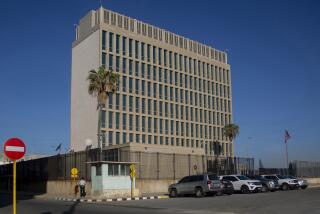Ill ground zero workers say U.S. failed to help
- Share via
NEW YORK — Two subjects of a new documentary film joined the chorus of voices determined to focus attention on people who have developed debilitating health problems after breathing toxic dust from the collapsed World Trade Center towers.
William Maher and John Graham traveled to Cuba as part of “Sicko,” a documentary on the U.S. healthcare system by filmmaker Michael Moore. He brought the men, who had helped clean Lower Manhattan, to Cuba to try to get medical treatment for them at the U.S. naval base at Guantanamo Bay.
In the film, Moore argues that terrorism suspects at the detention facility there receive better medical care than the heroes of 9/11. He heads toward Guantanamo in a boat with ground zero workers, and as cameras roll, Moore calls out through a bullhorn that he wants to bring his friends for treatment at the base. He gets no response, so he takes them to Havana. Healthcare is free in the communist country.
Maher and Graham, who spoke at a news conference Friday held by U.S. Rep. Jose E. Serrano (D-N.Y.), said they went to Cuba after the U.S. government and healthcare system failed to provide the support for medical treatment they needed.
New York City agreed this week to include on the official list of Sept. 11 victims an attorney who died of lung disease months after the attacks. Hers is the first death the city medical examiner has confirmed to be the result of dust from the twin towers’ collapse. (It was the only such death the office had been asked to review and definitively link to the collapse, office officials said.)
“For those who are still suffering, hopefully we can get the help to them that they have not been able to get,” said Maher. “Some, as we speak, are dying.”
Maher said many of his fellow workers had died in the last year or so from injuries and illnesses caused by working at ground zero. He called for more help with medical expenses, because many had lost their jobs and lacked health insurance.
In Cuba, Maher received treatment for jaw injuries from stress-related tooth grinding.
John Graham spoke of his struggles to receive treatment in the U.S. for lung and kidney problems, injuries to his esophagus and stomach, and other ailments. Graham, a disabled carpenter, hasn’t had medical coverage since 2005.
Graham rushed to ground zero before the second plane hit. He worked there on and off for months.
In Cuba, he was able to receive medical tests and treatment. “I know a lot more about my medical condition now than I did before,” he said.
Moore is being investigated by the U.S. Treasury Department for traveling to Cuba for the filming of “Sicko.” Cuba is under a trade embargo from the U.S., and Americans are not allowed to visit the island without special permission.
Moore applied for permission to go to Cuba as a journalist but never received a response.
U.S. Treasury spokeswoman Molly Millerwise said the penalty for violating the travel ban ranged from a warning letter to up to $65,000 in fines. She would not comment on whether the ground zero workers were being investigated for going to Cuba, but she added, “It is not consistent with our policy to license travel to Cuba for medical care.”
Serrano said he was disappointed that tax dollars were going to support an investigation of Moore’s trip to Cuba. He said ground zero workers had “paid a major price.”
They have “health conditions that have cost them employment, health conditions that have put them in difficult family situations, health conditions that have totally changed their lives forever,” Serrano said. “Our government ... talks about how much we respect them.”
He continued, “We have, in fact, ignored them.”
This report includes information from the Associated Press.
More to Read
Sign up for Essential California
The most important California stories and recommendations in your inbox every morning.
You may occasionally receive promotional content from the Los Angeles Times.












